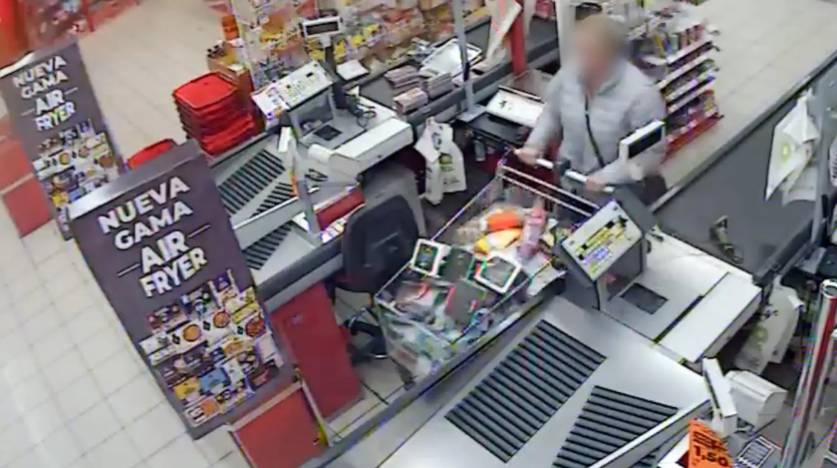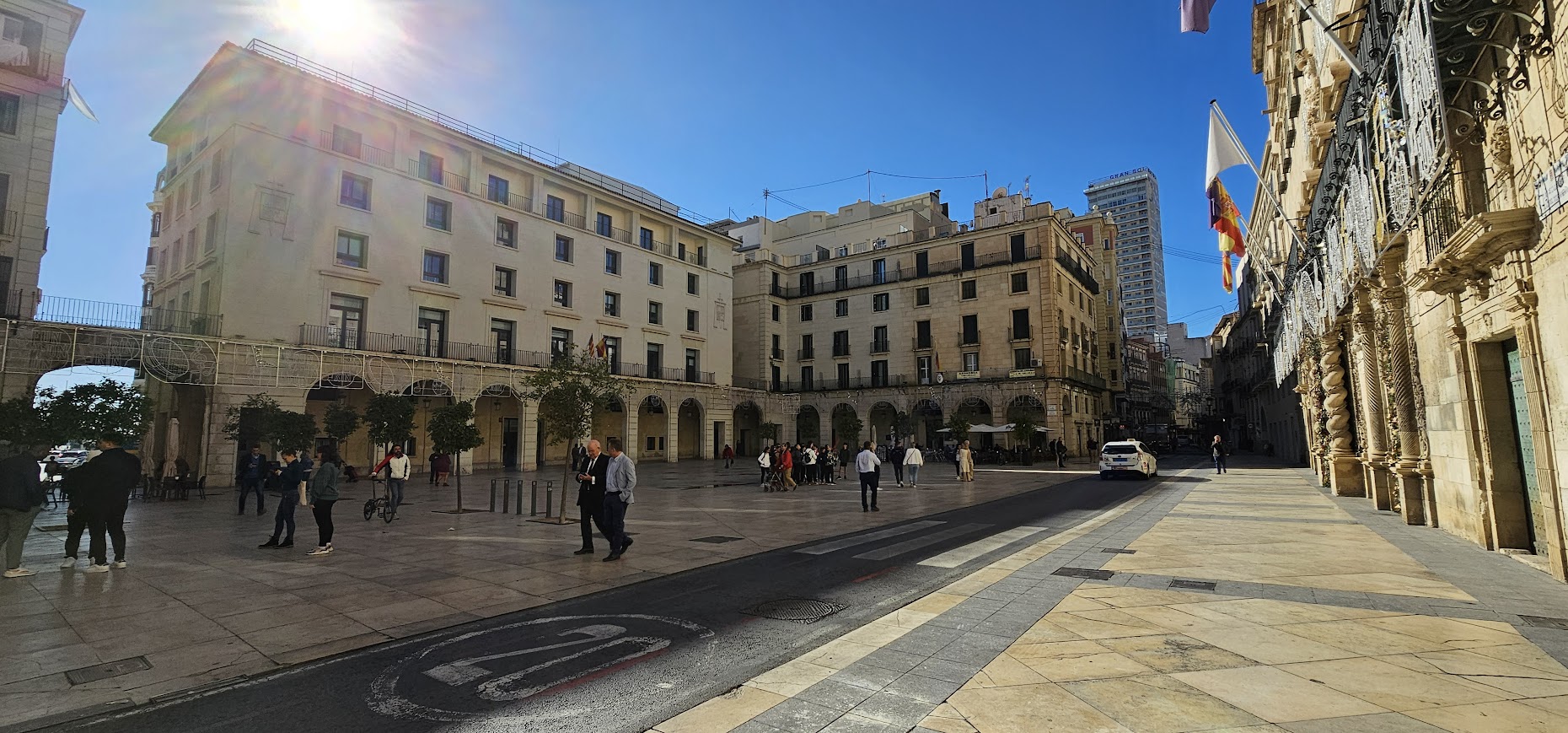Costa Blanca
Five arrested in Alicante and Murcia for shoplifting

Five individuals involved in grocery theft have been taken into custody by the Guardia Civil. In the regions of Alicante and Murcia, the thieves were stealing in a number of locations for a well-known supermarket company. The things that were stolen are worth over 8,000 euros in total.
The investigation started after the retail chain representative filed a complaint. The pattern was consistent across all cases: three or four people went into the store, and one of them loaded up a cart with expensive things like canned goods, extra virgin olive oil, sausages, or alcoholic drinks. The last one hurried out of the grocery without paying, and another diverted the attention of the staff.
It was discovered that the same people were responsible for the crimes in multiple towns in Alicante and Murcia after examining the security footage from the impacted businesses. Since the suspects did not live in the residences where they were registered and lacked a stable address, it was very difficult to find them.
Shortly after committing another theft at a store in a suburban neighbourhood of Rojales (Alicante), officers caught two of the suspects off guard and took them into custody. Many of the stolen goods were found at that time and brought back to the impacted business.
The other three were later taken into custody in the cities of Almoradí (Alicante) and Guardamar del Segura. The majority of the pilfered items were sold on. Additionally, the two cars that were utilised in the crimes were taken.
Eleven thefts have been resolved as a consequence of the investigation conducted by the Novelda Civil Guard’s investigation section. The cities of Novelda, Torrevieja, Almoradí, Catral, and Rojales in Alicante as well as the municipalities of San Javier, Jumilla, San Pedro del Pinatar, Cartagena, Archena, and Caravaca de la Cruz in Murcia were the sites of these crimes.
Discover more from Costa Blanca Daily
Subscribe to get the latest posts sent to your email.
Business and Financial
Goodbye to traditional credit cards: the most radical change is here, and banks confirm it

Credit cards have been utilised for years to make purchases, make online payments, pay for subscriptions, or pay for any service or supply. Nevertheless, they have also become an ideal target for digital larceny and scams. The rationale? Their printed 16 digits, which are indispensable for transactions, can also be exploited by fraudsters to gain access to our bank accounts. However, the finance sector is currently undertaking an unprecedented initiative to address this vulnerability. Please note that we will be saying goodbye to credit cards, or at least to how we used to use them.
Mastercard and Visa are currently investing in this change to enhance user security. The objective is evident: to abandon conventional cards with visible numbers and replace them with more secure, intelligent, and, most importantly, more difficult to replicate versions. It is no longer solely about aesthetics; it is about digital survival. This is the reason why the financial sector is preparing to definitively bid farewell to conventional credit cards. Although some individuals may have already experienced the change or are currently observing the changes in their cards, others will observe it over the next few years as a result of a system that is based on technologies such as tokenisation. This system marks a before and after in the way we interact with digital money, protect ourselves, and pay, and we will elaborate on this in detail below.
Farewell to conventional credit cards
The credit card companies that we all use, Visa and Mastercard, are in the process of preparing for a change that will impact millions of people worldwide. Visa appears to have been employing a technology for more than a decade, which, according to official data, has generated over 10 billion tokens since 2014. Revolut and Wise have been providing virtual and physical cards with these new measures for an extended period, and it is estimated that they have successfully prevented at least 650 million forgeries as a result of their dedication to this system.
Additionally, Mastercard is one of the most frequently utilised payment networks on a global scale. Until recently, all of its cards contained a sequence of 16 visible digits that, while necessary for identifying the country, entity, and account type, also served as a gateway for various forms of fraud. However, Mastercard’s new security strategy suggests that it will begin by removing this visible numbering entirely, beginning with its partnerships with financial institutions such as AMP Bank.
Mastercard has stated that its objective is to ensure that all of its users have cards without visible numbers by 2030. This initiative is a wager on a new era in which banking data is not susceptible to malicious digital captures or prying eyes.
Tokenisation is the critical factor: what is it and how does it alter everything?
Tokenisation is the primary innovation that underpins this transformation. It is a system that substitutes conventional printed numbers with a unique, transient code (the token) that is automatically generated each time a purchase is made. This code is non-reusable and ceases to exist upon transaction verification. Therefore, they would be unable to do anything with it even if they were to intercept it.
This system would render it impossible for a cybercriminal to replicate the transaction, even if they attempted to fraudulently use your card. This new protocol enhances cybersecurity to unprecedented levels and eliminates one of the primary vulnerabilities of the current system: the direct exposure of sensitive data.
Absolute user control and biometric authentication
An additional significant benefit of this new technology is that users will have much greater control over their cards. The new cards will rely on biometric authentication to validate transactions, as they lack engraved numbers or visible data. This may include fingerprint, facial recognition, or mobile app authentication.
Furthermore, this new system eliminates the necessity of manually inputting card details for each online purchase. Tokens will be employed by compatible payment platforms to expedite and secure the completion of transactions, ensuring that your information is not stored or disclosed.
When will I obtain my new card without numbers?
The only action you will likely need to take is to wait, regardless of whether you have a Visa or Mastercard. When it is time to renew your current card for a new generation card, your bank will notify you. Some banks have initiated the procedure, while others will do so in the coming years, prior to the final deadline of 2030.
It is advisable to maintain the security of your data and consistently enable two-step verification for online transactions until that time. However, those who have experienced an identity theft attempt or card theft can rest assured that the future is here and it is replete with security.
Discover more from Costa Blanca Daily
Subscribe to get the latest posts sent to your email.
Costa Blanca
Man acquitted of sexual assault charges in Elche

A young man has been absolved of alleged sexual abuse against his flatmate in the early hours of September 8th, 2022, at a residence in the Elche area by the section of the Alicante Court based in Elche. The Court determined that the evidence presented did not reasonably preclude the possibility of the complainant’s consent. The tribunal employed the legal principle of ‘in dubio pro reo’, which requires a resolution in favour of the accused when there are reasonable doubts about their guilt.
The individuals involved had a prior relationship with a history of “physical contact and mutual flirting,” as the facts outlined in the verdict. Both individuals acknowledged that they had engaged in intimate interactions both prior to and subsequent to the incident in question. The forensic report verified that no physical injuries or instances of violence were documented.
The accused, who was represented by attorney José Manuel Ortega, informed the judges that all interactions with the complainant, his flatmate for approximately a year, were “consensual and voluntary” for both parties. This assertion has been corroborated by the judicial resolution.
In his testimony, he described their intimate relationship as characterised by “frequent sexual encounters,” sharing space on the sofa, and even sleeping together once or twice a week. He also asserted that their initial sexual encounter took place on the sofa approximately three months after they began living together. He also stated that their interactions frequently began with teasing, without either party explicitly seeking permission or engaging in follow-up discussions.
The accused stated that he was unaware of the reasons why the young woman decided to press charges in relation to the complaint. He suggested that the reasons may have been motivated by “jealousy” or a desire to “justify to a new partner the sexual relationship they had.” The accused also disclosed that they continued to reside together subsequent to the complaint, despite his subsequent departure from the flat. He observed that the police had visited the residence on numerous occasions as a result of cohabitation issues, including commotion or other minor disputes.
The tribunal observed that the complainant did not expressly express her refusal at the time of the events, and that the accused may not have perceived a clear lack of consent during the evidence evaluation. Additionally, the court noted substantial contradictions and omissions in the version provided by the alleged victim, such as the absence of prior relationships or the previous context of intimacy.
In this regard, the ruling underscores the distinction between the presumption of innocence, which pertains to the burden of proof, and the principle of “in dubio pro reo,” which is applied to the assessment of evidence when, despite the presence of evidence, a reasonable doubt regarding the elements of the crime persists.
The tribunal has issued an acquittal and lifted all precautionary measures that were agreed upon during the process, as it was unable to establish with the necessary certainty that the accused committed a wilful act, not even with eventual intent. No party has appealed the sentence, which is final.
Discover more from Costa Blanca Daily
Subscribe to get the latest posts sent to your email.
Costa Blanca
Gold shop in Denia robbed at gunpoint

Yesterday, Wednesday April 16th, a gold purchasing and selling establishment in Dénia was violently robbed at gunpoint. The incident occurred in the early afternoon, as the woman who manages the establishment was preparing to open up. Two individuals wearing helmets held her at gunpoint and escorted her into the store.
The criminals subsequently departed the establishment, which is situated on Avenida del Montgó. The exact amount of the theft remains undisclosed at this time.
Discover more from Costa Blanca Daily
Subscribe to get the latest posts sent to your email.
-

 Costa Blanca1 week ago
Costa Blanca1 week agoThis week the DGT will issue over 64,000 speeding tickets
-

 Costa Blanca1 week ago
Costa Blanca1 week agoSix arrested for the use of AI to defraud over 19 million euros
-

 Costa Blanca2 weeks ago
Costa Blanca2 weeks agoThis weekend Alicante will be visited by three NATO ships
-

 Costa Blanca1 week ago
Costa Blanca1 week agoBeware if you receive an orange envelope in your postbox
-

 Costa Blanca2 weeks ago
Costa Blanca2 weeks agoFire in Benidorm sees two being treated for smoke inhalation
-

 Costa Blanca1 week ago
Costa Blanca1 week agoWhy aren’t salaries in Spain rising while everything else is?
-

 Costa Blanca2 weeks ago
Costa Blanca2 weeks agoWhat is the reason for the disappearance of Chinese bazaars in Spain?
-

 Costa Blanca6 days ago
Costa Blanca6 days agoSpanish family killed in helicopter crash in New York












